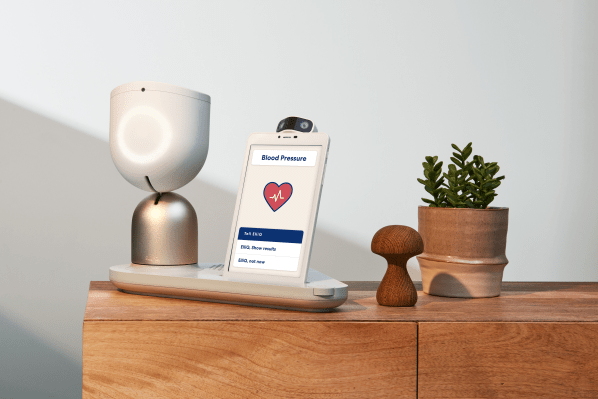W
elcome to the TechCrunch Exchange, a weekly startups-and-markets newsletter. It’s inspired by the daily TechCrunch+ column where it gets its name. Want it in your inbox every Saturday? Sign up here.
In the era of quick judgments, it’s tempting to think we are more clever than anyone else. But from AI to Apple to senior tech, underestimating others comes at a risk: being seriously wrong. — Anna
Don’t underestimate your granny
When the U.S. surgeon general’s advisory called out “our epidemic of loneliness and isolation,” heads immediately turned to social media and its risks for children and teens.
I can only agree with Dr. Vivek Murthy that social connection and community have healing effects, but I am on the fence on where technology stands. Sure, it can make us more isolated, but it can also connect us.
Dor Skuler, a founder I met recently, thinks that age makes a difference. “While the surgeon general warns technology is a contributing factor for teen loneliness, the report and our data shows the opposite holds true for older adults,” he said.
Skuler is referring to the insights gathered by his company, Intuition Robotics. He has a horse in the race: Its flagship product is ElliQ, an AI companion aiming to achieve “healthier, happier aging.” But he also has data: After years in beta testing, ElliQ is being distributed to American seniors through several state aging agencies.
In practice, this means that the next person who will greet your grandmother in the morning or ask how she is doing might not be a person. But if you think that an AI companion for Granny is any more dystopian than Alexa, maybe you are underestimating her.
“The older adults are just like everyone else, just older,” Skuler said. “They are intelligent, they understand ElliQ is not a human.”
However, “they also understand this is not a device and not a regular piece of technology. They’re carving out a new space for a relationship with their AI. They call ElliQ an entity, a roommate, a presence in their life. And they know what it is and what it isn’t. They leverage it for what it is.”
I saw a demo of ElliQ and can confirm that the interaction with this social robot feels more rewarding than it may seem; I also understand that it gets better over time. “It’s about a long-term relationship with a single AI and a single human that evolves over time built on proactive, contextual, goal oriented and empathic interactions,” Skuler said.
Unlike teens who may be missing out on the outside world by spending too much time online, seniors often have less of a choice. “Because of the way our society is structured, with extended families living apart, there’s no way that we can solve loneliness for older adults without technology,” Skuler said.
I have no doubt that loneliness does need to be addressed. In Murthy’s words: “Loneliness is far more than just a bad feeling — it harms both individual and societal health.”
I still wish we humans could take better care of elders ourselves, but Intuition Robotics doesn’t position ElliQ as a substitute. “There’s just no choice but to leverage technology, not to replace humans, but to facilitate human-to-human interactions on one side, and to ease the sense of loneliness and social isolation directly through companionship from the other side.”
However, I worry that new players and experiments that may join the ranks of ElliQ and competitor Replika might not be as ethical.
Is there a risk that seniors will get entangled in “Her”-like relationships, where the human falls in love with the machine? Unfortunately, the task of avoiding this seems to rest on makers’ shoulders.
“Given that there’s a lack of regulation, we need to regulate ourselves for now. AI-driven product developers and designers have to have a very strong ethical stance on several topics: The AI should clearly represent itself as an AI and not pretend to be human […]; make sure that the data or the conversations that are generated by these technologies are accurate and not misleading or harmful; and most importantly make sure the AI always operates in the best interest of the users.”
Ultimately, this brings us back to Asimov’s three laws of robotics. Perhaps it’s time to make them law?
Don’t underestimate Europe
The only two new European unicorns of 2023, DeepL and Quantexa, are both in the field of AI, VC firm Atomico noted alongside its latest report. Its co-author, principal Sarah Guemouri, commented on the region’s sometimes underestimated potential in this new wave:
“Europe has a track record of creating breakthrough AI companies, with Celonis, UIPath, Scandit, Tractable and more. As we move into a new AI supercycle, we must be careful not to underestimate Europe’s role. Generative AI has seen a massive uptick in European funding, and we’re now starting to see local AI unicorns competing with global giants […]. Europe has a seat at the table to innovate in this space, and the potential for value creation is huge.”
Don’t underestimate Apple
Sure, “Apple may not have completely nailed the Vision Pro launch.” But, my colleague Haje warns on TechCrunch+, “betting against Apple is pretty silly. With a few notable exceptions, the company has a formidable track record of willing entire ecosystems into existence. It is against that backdrop that Vision Pro shows up.”
